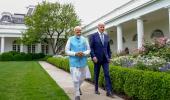'In Eastern Ladakh the Chinese attempted salami slicing.'
'Our response has been superb. Our military has responded magnificently.'

In nearly 35 years in the Indian Foreign Service, Ambassador Gautam Bambawale served four tenures in China.
He speaks fluent Mandarin, is an expert on China and understands the complexities of India-China relations extremely well.
"If the Chinese feel that they can take something by force, then it is impossible to negotiate with them. They just stall the negotiation thereon. We too should not negotiate under such pressure. However, keep in mind, that we have taught the Chinese some lessons in Eastern Ladakh," he says about the challenges of dealing with Chinese.
"One of our goals must be to continue India's rise and reduce the asymmetry with China. Each one of us must contribute towards India's enhancing comprehensive national power. Once that is achieved significantly, there is nothing much that the Chinese can do," he says in the second part of a detailed interview with Rediff.com's Archana Masih and Nikhil Lakshman.
- Part 1 of the Interview: 'Xi had already ordered Galwan when he met Modi in Chennai'
What implication is the recent tension with the Maldives likely to have on India, especially in view of President Mohammad Muizzu's visit to China?
The situation has more to do with the domestic politics of Maldives. Of course, the current tension is a problem for India presently, but India will tackle it going forward. We shall do what it takes. This is how international politics is played.
The countries in South Asia will try to balance between India and China. It is a politico-diplomatic game which India too will continue to play.
As you know India gives sizeable development assistance to all its neighbouring countries including the Maldives. We do a lot of meaningful projects there which make a difference to the economy of the Maldives. We are doing much more than before because India is much more capable now. We shall continue with these activities as they benefit the people of the Maldives.
In the background of the China-Bhutan boundary negotiation, do you, as a former ambassador to Bhutan, feel that Bhutan is moving away from India's strategic influence?
China and Bhutan are still in the process of negotiating their boundary and this has been going on for several years. The process will have ups and downs. Analysts in India must remember this and not have knee-jerk reactions to every development.
Bhutan is a true friend of India and will do its best to keep India's interest in mind too. The two countries work very closely with each other. This will continue and we do not need to be suspicious of every new step. India needs to be pragmatic and mature in its relationship with Bhutan.
Are the talks on the boundary issue between India and China dead?
Boundary talks are off the rails till disengagement and de-escalation is achieved. Until then the boundary talks cannot take place.
The situation on the LAC will remain tense for an extended period. Just as our military had to man the heights in the thick winter after the Kargil conflict, we are now doing the same on the LAC with China.

Did Prime Minister Modi invest too much into the relationship with Xi Jinping?
I don't think he invested too much. He was looking at the possibility of India-China finding a new template to work together. It was a normal diplomatic outreach which was needed by both countries.
Xi also invested in the relationship with Modi.
Some compare what occurred post April 2020 in Ladakh to what Zhou Enlai and Mao Zedong did to Jawaharlal Nehru.
I disagree with this comparison because the 1962 War was a full scale conflict that India lost badly. We lost territory, but then the Chinese went back to their original positions.
In Eastern Ladakh the Chinese moved two divisions of troops and attempted salami slicing. Our response has been superb. Our military has responded magnificently.
As I said earlier, when considering what happened in Eastern Ladakh, since there is no agreed boundary, you should not ask whether India has lost territory or whether China has lost territory. You must ask whether the status quo has changed and the answer is yes.

As a diplomat who spent four tenures in China, in your assessment, how difficult is it to deal with the Chinese?
First, you have to come to a situation which is in the interest of both countries. Once you arrive at that point, then things move fast.
If the Chinese feel that they can take something by force, then it is impossible to negotiate with them. They just stall the negotiation thereon. We too should not negotiate under such pressure. However, keep in mind, that we too have taught the Chinese some lessons in Eastern Ladakh.
Meanwhile, India has also strengthened its comprehensive national power.
I want to highlight three recent events which are manifestations of India's increased national power:
- The Chandrayaan-3 moon landing
- Successfully hosting the G-20 Summit in India
- Highest ever medal tally of over 100 medals at the Asian Games in Hangzhou last year.
One of our goals must be to continue India's rise and reduce the asymmetry with China. Each one of us must contribute towards India's enhancing comprehensive national power. Once that is achieved significantly, there is nothing much that the Chinese can do. So the answers to many issues in international politics lie within India. They lie in the domestic realm.
How long do you think it will be before India can bridge this asymmetry with China?
If India grows at 8% per annum and China grows at 5% per annum, then by 2047 China will be an 88 trillion dollar economy in purchasing power parity (ppp) and India will be a 66 trillion dollar economy in ppp. So we would have reduced the gap.

Do you think the Ladakh standoff can only be resolved if Mr Modi and Xi meet?
I don't think that is entirely true. No doubt it will need high level intervention, but such a resolution does not happen at the top most level. It has to start at the bottom and the final decision can be taken at the higher level, but the options have to come from the bottom.
Will the Chinese continue being obdurate?
At least in two-three areas, we have reached de-escalation. At Pangong lake for example. They are being obstinate in Depsang, so we will continue to be present there militarily and simultaneously keep talking to them. We too have to be obstinate -- I don't know why it is so difficult to see this?
So the LAC will continue to be live?
Yes, at least in Sub Sector North (SSN). Eastern Ladakh will be manned through the winter.

Could the PLA open a fresh point on the LAC, perhaps in the central sector?
They could, but India could also do that. I don't understand why you are blind to these kinds of possibilities. The Indian media must open its mind to the fact that both sides can play such games. Not just one side. The government has been investing a lot of financial resources to beef up security and infrastructure on the LAC.
Additionally, the Indian economy has been doing well; tax revenue is buoyant and the government has wherewithal to spend more.
Our economy is much smaller than China or the US, but if we narrow that gap in the next 10, 20 years then the Chinese will be able to do less.
So the answers to such questions lie within India and not outside of India.
Do you think China is trying to influence domestic politics in India?
China tries to do this in many countries. If they try it in India, it will backfire. Indians have great national pride and are patriotic. If the Chinese want them to do one particular thing and try influencing our public opinion, Indians will do just the opposite! So this is a double edged sword.
Whichever government has been in place at the Centre has always kept the nation's interest foremost and that is unquestionable.
- Part 3 of the Interview: 'China will have to untie the knot if the relationship has to improve'
Feature Presentation: Aslam Hunani/Rediff.com











 © 2025
© 2025